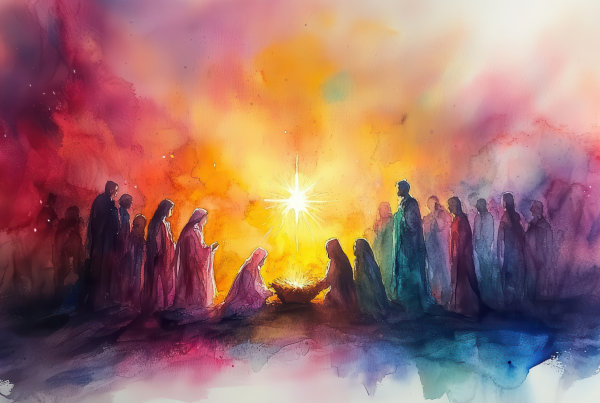At first glance, the Quetzaltenango Cathedral appears as two churches. The first face of the cathedral displays complex designs carved in ancient stone. The stone of the second facade and building is smooth, supporting stained glass windows, and graceful domes. Both faces tell a history of struggle, beauty, and hope.
Construction on the Quetzaltenango Cathedral began around 1532. Over the next three hundred years, strong earthquakes eroded the church’s foundation. In the late 1850s, the damage became too severe to repair. The town tore down and rebuilt the cathedral. They lovingly preserved the original facade, building a stronger structure around it. The two seemingly disparate buildings unite, tying past and future together.
Christians exist in a similar duality. Sin shook the foundations of our hearts and minds, fracturing our world. Our original “dwellings” could not stand. But like those ancient architects, God was unwilling to abandon the wreckage. He rescued his creation from disaster, building a heavenly home for all who trust in his son. The original building is not fully destroyed, however. God preserved our original facade, where we live and work in his name. We remain on earth until God calls us to indwell our new home in heaven. Paul puts it this way, “For we know that if the earthly tent we live in is destroyed, we have a building from God, an eternal house in heaven, not built by human hands” (2 Corinthians 5:1).
We belong to heaven, even when we reside on earth. We are citizens of God’s kingdom, living as ambassadors in a foreign land. Ambassadors represent the traditions, culture, and habits of their home wherever they go. When FIP’s Guatemalan staff travel to Houston, they come bearing champurradas and huipils. They watch Guatemalan football and kiss one another in greeting. As Christ’s ambassadors, we represent our king and his kingdom. Though we live on earth, we practice the ideals of heaven. If someone studied our lives, what would they learn about our home country?
As God’s ambassadors, we represent a culture of grace and reconciliation (2 Corinthians 5:20). We should practice forgiveness to those who harm us. Seek justice for the oppressed. Serve those around us. Through our life and witness, we encourage others to be reconciled to God.
There will be days we miss our home country. Days when we are surrounded by pain and suffering, aftershocks of sin that rock our foundations. We long for our heavenly dwelling. On those days, we can gather together as a family, break champurradas, and fix our eyes on the future.
“Therefore we do not lose heart. Though outwardly we are wasting away, yet inwardly we are being renewed day by day. For our light and momentary troubles are achieving for us an eternal glory that far outweighs them all. So we fix our eyes not on what is seen, but on what is unseen, since what is seen is temporary, but what is unseen is eternal” (2 Corinthians 4:16—18)





